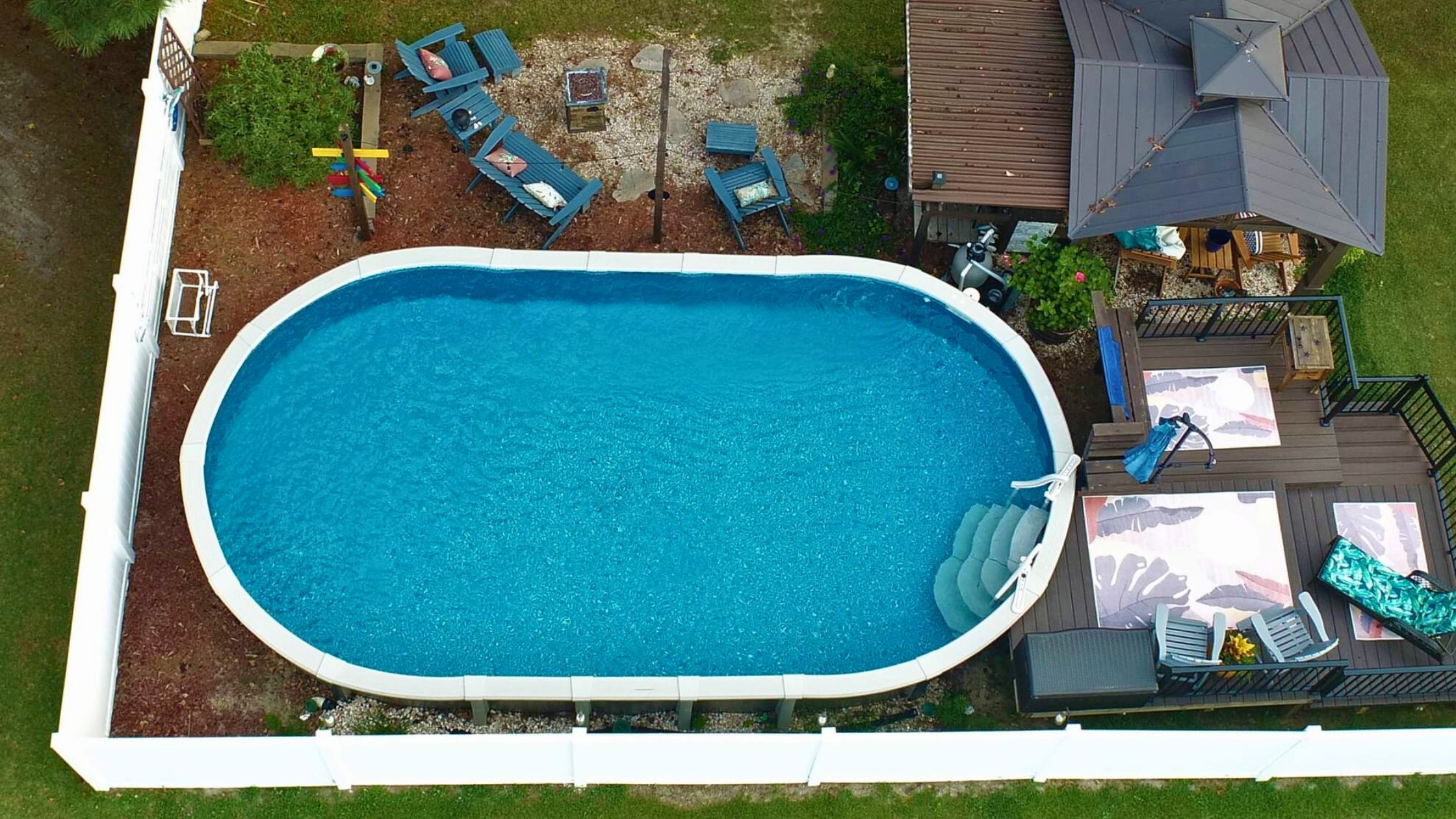How to Winterize Your Aboveground Pool in the Triangle

How to Winterize Your Aboveground Pool in the Triangle
- November 21, 2025
- Outdoor Living, Pools
As the days grow shorter and temperatures dip in the Triangle, many pool owners start thinking about winterizing their aboveground pools. While North Carolina winters are generally mild, they can be unpredictable, with occasional freezes that can damage your pool if it isn’t properly prepared. Proper winterization protects your investment, keeps water clean, and ensures a smoother reopening in the spring.
Rising Sun Pools has been helping homeowners across central North Carolina enjoy safe, beautiful pools since 1972. Our step-by-step winterization guide will help Triangle residents protect their aboveground pools through the colder months.
1. Clean Your Pool Thoroughly
Before you close your pool for the season, start with a deep clean. Removing debris, algae, and dirt now makes spring reopening much easier.
Steps:
- Skim the surface to remove leaves, twigs, and bugs.
- Brush the walls and floor to dislodge algae and grime.
- Vacuum the pool to remove any debris that has settled.
- Check the filter and clean it thoroughly; a clean filter reduces stress on your system.
These simple steps prevent staining and keep water chemistry more stable during the winter months.
2. Balance the Water Chemistry
Even during winter, water chemistry matters. Properly balanced water prevents corrosion, scaling, and algae growth while your pool is closed.
Key areas to check:
- pH: Keep between 7.2–7.6
- Alkalinity: Maintain 80–120 ppm
- Calcium hardness: 200–400 ppm
- Chlorine or sanitizer: Bring levels to the high end of recommended ranges to prevent algae growth
Adding a winterizing chemical kit designed for aboveground pools can help maintain clarity and prevent bacterial buildup while your pool is not in use.
3. Lower the Water Level (But Don't Drain Completely)
Water expands when it freezes. If your pool is filled too high during a hard freeze, that expansion can put immense pressure on walls, seams, and your liner, potentially causing cracks, tears, or structural damage.
Here's what to do:
- Lower the water to 4–6 inches below the skimmer opening (or follow your manufacturer's specific recommendation).
- Don't drain your pool completely unless you're using a specialized air pillow system or your cover requires it.
- Leave enough water to protect the liner. An empty pool can lead to a dried-out, brittle liner that cracks or shrinks.
In the Triangle's relatively mild climate, keeping water in your pool through winter actually helps. It weighs down the structure, prevents wind damage to the liner, and keeps vinyl supple.
4. Drain and Store Pool Equipment
Your pool’s pump, filter, and other equipment are at risk during freezes. Drain all water and store equipment in a dry, protected location.
Steps:
- Disconnect hoses and remove the pump, filter, and heater (if applicable).
- Drain water completely and store indoors or in a shed.
- Blow out water from lines using a shop vac or air compressor to prevent freezing.
This precaution keeps your investment safe and avoids costly repairs in the spring.
5. Install a Winter Pool Cover
A quality winter cover is essential for protecting your aboveground pool during North Carolina’s unpredictable winters.
Tips for covering your pool:
- Use a tight-fitting, durable cover to prevent debris from entering.
- Secure with straps or water bags to keep the cover in place during windy days.
- Ensure the cover has a drain or sump pump system to avoid water pooling, which can stress the cover or pool walls.
A good cover reduces maintenance work and protects your liner, making reopening in spring much easier.
6. Add a Pool Cover Pump
Even with a winter cover, rainwater and snow can accumulate. A pool cover pump removes excess water and prevents the cover from sagging or collapsing.
- Place the pump in the center of the cover.
- Check periodically after heavy rain or storms.
- Keep the water level under the cover slightly lower than the pool water itself.
This simple step can prevent structural damage and reduce cleanup time in the spring.
7. Consider Freeze Protection Accessories
While the Triangle usually has mild winters, sudden cold snaps can occur. Aboveground pools benefit from freeze protection devices, such as:
- Floating freeze balls that absorb expansion pressure
- Insulated covers or foam-filled pool noodles along the edges
Even inexpensive additions can save significant repair costs and extend the life of your pool.
8. Schedule Professional Winterization if Needed
For homeowners who want peace of mind, Rising Sun Pools offers professional winterization services throughout Central North Carolina. Our team will:
- Fully drain and clean your pool
- Balance water chemistry
- Secure covers and accessories
- Inspect equipment and liners for early signs of damage
With decades of experience, we know how to protect aboveground pools from Triangle winters’ unpredictable conditions, saving you time and hassle.
Keep Your Pool Safe All Winter
Winterizing your aboveground pool doesn’t have to be stressful. With the right steps, you can prevent costly damage and make spring reopening effortless.
For over 50 years, Rising Sun Pools has been the Triangle’s trusted pool builder and service provider. Locally owned and family-operated, we are committed to helping our customers enjoy safe, beautiful pools year-round. Let us help you protect your aboveground pool this winter so you’re ready to soak again when the weather warms.
Ready to winterize your pool? Contact Rising Sun Pools today for expert service and guidance that ensures your pool survives the Triangle’s mild but unpredictable winter.
Recent Posts
- From Green to Clean: How to Fix Cloudy or Algae-Filled Pool Water Fast
- The Hidden Costs of DIY Pool Maintenance (and How to Avoid Them)
- Why It’s Time to Renovate That “COVID Pool” and Why Rising Sun Pools Builds Better
- Winter Water Chemistry: Why It Still Matters Even When You’re Not Swimming
- How to Winterize Your Aboveground Pool in the Triangle
- Energy-Efficient Hot Tub Tips for Triangle Homeowners
- Investment Protection: How Regular Fall Maintenance Saves You Thousands
- Leaf Management: Protecting Your Pool from Fall's Beautiful Mess
- Why September May Be the Best Time to Start Planning Your Pool Project
- Why Pool Customers Can Trust Rising Sun Pools
